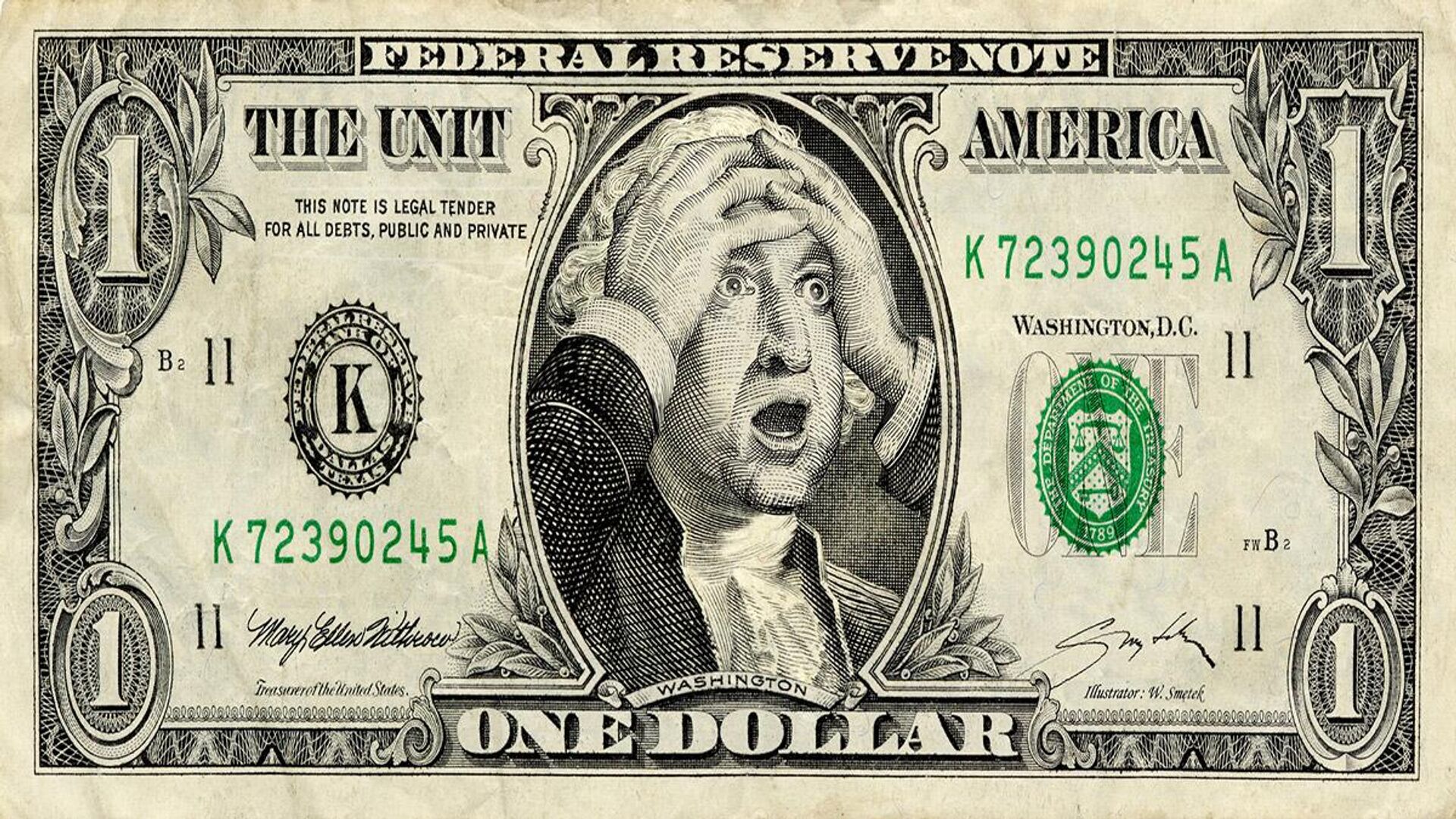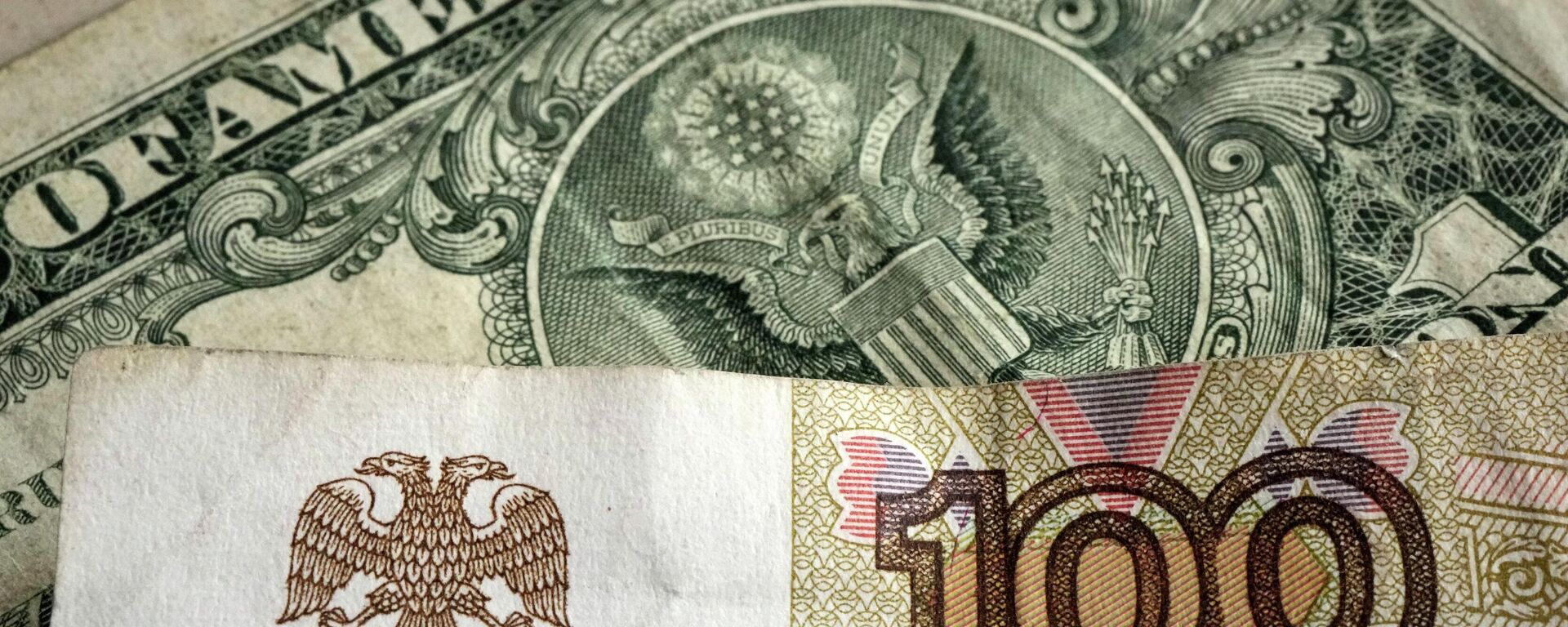https://sputniknews.in/20240229/india-shares-russias-de-dollarisation-goal-6705505.html
India Shares Russia's De-Dollarisation Goal
India Shares Russia's De-Dollarisation Goal
Sputnik India
President Putin said in his State of the Nation Address that Russia would create a "new global financial architecture" as the Western currencies, banks and systems like SWIFT are discredited.
2024-02-29T19:40+0530
2024-02-29T19:40+0530
2024-02-29T19:40+0530
business & economy
india
russia
new delhi
brics
g7
vladimir putin
western sanctions
sanctions
brics expansion
https://cdn1.img.sputniknews.in/img/07e7/05/12/2022438_0:0:1200:675_1920x0_80_0_0_11031177f3e47530cb0df5292ec6220b.jpg
India is very much supportive of Russian President Vladimir Putin's priorities during Russia's BRICS presidency in expanding the use of national currencies in trade settlements as well as floating non-western, alternative payment mechanisms, experts have said.Bhatia underscored that the increased use of national currencies in trade settlements was also high on India's economic agenda, in line with the Foreign Trade Policy (FTP) 2023-28 which calls for encouraging Indian Rupee (INR) trade.At his State of the Union Address to the Russian Federal Assembly, Putin highlighted that the share of BRICS nations in the global GDP was slated to rise to 36.6 percent by 2028. He contrasted this to the GDP share of G7, which is projected to decrease to 27.8 percent.India Shares Concerns Over US Dollar DominanceHe, however, stressed that US-backed western actions such as "freezing of assets or the policy of imposing unilateral sanctions" aren't supported by New Delhi, which has voiced concerns over these measures at groupings such as BRICS.Around $350 billion of Russian assets in the West have reportedly been frozen by the Western governments since 2022.Kumar said that there were concerns among many developing nations, including China, that the US could use its currency as a financial tool in case of geopolitical tensions with Beijing escalate into a war in the future.New Delhi's forex reserves amount to over $600 billion, most of it in USD.'De-Dollarisation Will Take Time, But Will Eventually Happen'Kumar spelled out several challenges associated with achieving the de-dollarisation of the BRICS' economies, which include the lack of consensus on what could function as an "alternative currency" and how to peg a common currency, in case there is a new one.He also noted that the US dollar was still the dominant reserve currency and was the predominant currency in global trade with a share of around 80 percent."In the BRICS grouping, at least India has concerns about a single non-USD currency dominating over other currencies... So, the issue is how to float a new BRICS common currency, to what do you peg it? Pegging it to the US Dollar wouldn't make sense. Pegging it with Chinese Renminbi on account of Beijing being the second-biggest global economy and the biggest BRICS economy won't make sense," he explained.He highlighted the example of China and Russia, which have been carrying out their $200 billion-plus trade in national currencies.
https://sputniknews.in/20240212/de-dollarisation-russia-settled-95-pc-of-its-trade-with-india-china-in-local-currencies-in-2023-6525046.html
india
russia
new delhi
china
south africa
ukraine
global south
Sputnik India
feedback.hindi@sputniknews.com
+74956456601
MIA „Rossiya Segodnya“
2024
Dhairya Maheshwari
https://cdn1.img.sputniknews.in/img/07e6/0c/13/138962_0:0:641:640_100x100_80_0_0_2cb44360dbcdf6d84bf4b299cd045917.jpg
Dhairya Maheshwari
https://cdn1.img.sputniknews.in/img/07e6/0c/13/138962_0:0:641:640_100x100_80_0_0_2cb44360dbcdf6d84bf4b299cd045917.jpg
News
en_IN
Sputnik India
feedback.hindi@sputniknews.com
+74956456601
MIA „Rossiya Segodnya“
Sputnik India
feedback.hindi@sputniknews.com
+74956456601
MIA „Rossiya Segodnya“
Dhairya Maheshwari
https://cdn1.img.sputniknews.in/img/07e6/0c/13/138962_0:0:641:640_100x100_80_0_0_2cb44360dbcdf6d84bf4b299cd045917.jpg
putin speech, putin state of the union speech, dedollarisation news, trade in national currencies, brics summit, brics expansion, russia india relations, russia india ties, brics common currency, upi, upi in uae, digital payments, russian oil exports, western sanctions, western sanctions on russia
putin speech, putin state of the union speech, dedollarisation news, trade in national currencies, brics summit, brics expansion, russia india relations, russia india ties, brics common currency, upi, upi in uae, digital payments, russian oil exports, western sanctions, western sanctions on russia
India Shares Russia's De-Dollarisation Goal
Russian President Vladimir Putin said in his address to the Federal Assembly on Thursday that Russia would create a "new global financial architecture" as Western currencies, banks and systems like SWIFT are discredited.
India is very much supportive of Russian President Vladimir Putin's priorities during Russia's BRICS presidency in expanding the use of national currencies in trade settlements as well as floating non-western, alternative payment mechanisms, experts have said.
"One of the priorities is to promote the floating of a multilateral payments system. And India is hoping, that in the process, countries such as Russia, Brazil, South Africa as well as the new members will help promote the expansion or interlinking of the UPI payments' system,'' Ambassador Rajiv Bhatia, a former Indian diplomat and a Distinguished Fellow at Mumbai-based think tank Gateway House, told Sputnik India.
Bhatia underscored that the increased use of national currencies in trade settlements was also high on India's economic agenda, in line with the Foreign Trade Policy (FTP) 2023-28 which calls for encouraging Indian Rupee (INR) trade.
"The whole idea is that it should be promoted in a manner so as not to be seen as anti-West. It should be viewed as a non-western approach of the BRICS," Bhatia stated.
"I can say with confidence that Moscow and New Delhi will work closely in promoting financial cooperation within BRICS," he added.
At his
State of the Union Address to the Russian Federal Assembly, Putin highlighted that the share of BRICS nations in the global GDP was slated to rise to 36.6 percent by 2028. He contrasted this to the GDP share of G7, which is projected to decrease to 27.8 percent.
India Shares Concerns Over US Dollar Dominance
Rajan Kumar, an author and Associate Professor at Centre for Russian and Central Asian Studies at School of International Studies (SIS) at New Delhi-based Jawaharlal Nehru University (JNU), told Sputnik India that New Delhi also shared concerns over the "dominance of US Dollar in the global financial architecture" on account of Washington increasingly resorting to using its currency as a "financial tool".
"India is not too vocal about the de-dollarization process because of its strong ties with the US and its bilateral trade with Washington. Dedollarization is an anti-West concept rather than being a non-West concept," Kumar said.
He, however, stressed that US-backed western actions such as "freezing of assets or the policy of imposing unilateral sanctions" aren't supported by New Delhi, which has voiced concerns over these measures at groupings such as BRICS.
Around $350 billion of Russian assets in the West have reportedly been frozen by the Western governments since 2022.
Kumar said that there were concerns among many developing nations, including China, that the US could use its currency as a financial tool in case of geopolitical tensions with Beijing escalate into a war in the future.
"India has reserves in the US dollar and that's why it does have legitimate concerns over the currency being used as a financial instrument by them," Kumar stated.
New Delhi's forex reserves amount to over $600 billion, most of it in USD.
'De-Dollarisation Will Take Time, But Will Eventually Happen'
Kumar spelled out several challenges associated with achieving the de-dollarisation of the BRICS' economies, which include the lack of consensus on what could function as an "alternative currency" and how to peg a common currency, in case there is a new one.
He also noted that the US dollar was still the dominant reserve currency and was the predominant currency in global trade with a share of around 80 percent.
"Countries around the world are definitely working on the idea of de-dollarisation. It may not succeed in the short term. It is a long-term process and gradually it will happen. But it will be a lengthy process," the academic reckoned.
"In the BRICS grouping, at least India has concerns about a single non-USD currency dominating over other currencies... So, the issue is how to float a new BRICS common currency, to what do you peg it? Pegging it to the US Dollar wouldn't make sense. Pegging it with Chinese Renminbi on account of Beijing being the second-biggest global economy and the biggest BRICS economy won't make sense," he explained.
Kumar, however, underscored that
BRICS nations were going about the de-dollarisation process in other ways, including through the use of national currencies and by diversifying their currency baskets by including more non-western currencies.
He highlighted the example of China and Russia, which have been carrying out their $200 billion-plus trade in national currencies.
"The plan to develop a multilateral digital payments system, as proposed by BRICS, or to create an alternative to SWIFT, could succeed much earlier," Kumar concluded.



